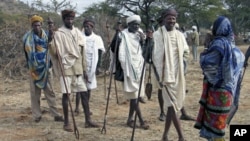Kenya and Ethiopia have agreed on measures to ease tensions along their border following deadly clashes between ethnic groups battling for scarce resources. The Horn of Africa neighbors will revive a long dormant ministerial commission to take on a host of prickly bilateral issues.
Delegations of senior Ethiopian and Kenyan officials sat down together Thursday at an Addis Ababa hotel to revive a Joint Border Commission that last met in 2004.
The session followed two urgent meetings last month between Ethiopian Prime Minister Meles Zenawi and Kenyan President Mwai Kibaki after border clashes that killed as many as 40 people.
The fighting involved groups of well-armed pastoralists who roam the region in search of increasingly scarce water and grazing land for their animals around Kenya’s Lake Turkana.
Kenya’s acting Foreign Minister George Saitoti led the visiting delegation. He told VOA the two sides had agreed to improve border security.
"Both countries are concerned because citizens of the two countries lost their lives," he said. "Of course the greater number were Kenyan citizens and we have agreed that we are going to take the appropriate measures to ensure that the borders are going to be properly managed and we are going to save the lives of the people."
Diplomats involved in the talks say the agreement involves increasing the number of check posts along the 800-kilometer-long frontier.
Officials say Thursday’s session touched on a broad array of topics, of which border security was just a small part.
Ethiopian Foreign Minister and Deputy Prime Minister Hailemariam Desalegn said part of the problem is that nomadic pastoralists have been scouring the region for water and grazing land since before international borders existed.
“Border security is not only related to resources competition," said Hailemariam Desalegn. "Traditionally this has been there for centuries. It’s not a new event that has happened. So if you see for many years there have been clashes between pastoral ethnic groups from this side or that side. Cattle raiding was there for centuries.”
The Ethiopian minister said any comprehensive solution must address the root cause of the increasingly bitter struggle for resources in the Lake Turkana region.
"The Lake Turkana issue is a comprehensive environmental, climate [concern]," he said. "It’s not only the water issue, it’s a number of issues together, including the livelihood of the communities on both sides of the border. The water bodies are reducing everywhere in the Rift Valley. It’s not because the water has been used. It’s because the rivers flowing to the lakes are reducing because of climate change."
Ironically, the border clashes may result in a renewed push for healthier bilateral relations on a variety of fronts. The revived joint ministerial commission is planning to hold regular meetings after its seven-year hiatus, on issues from development and security cooperation to establishing stronger economic ties.
One member of the visiting delegation, who had not previously visited Ethiopia, said he was surprised to see the almost complete absence of Kenyan goods on store shelves. He commented, “there is room for a massive increase in bilateral trade."
Kenya, Ethiopia Agree on Steps to Reduce Border Tensions












